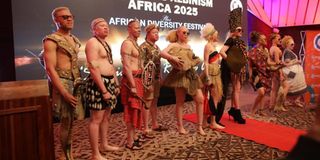African models inspire people with albinism to defy prejudice

Contestants display attire at the inaugural Mr and Miss Albinism Africa 2025 pageant in Harare, Zimbabwe, June 28, 2025.
What you need to know:
- Inaugural Mr and Miss Albinism Africa 2025 pageant in Harare showcased the beauty of individuals with albinism.
- Organized by the Albinism Dare to Dream Initiative, the pageant also coincided with the African Diversity Festival.
In a world where people with albinism still face stigma, Brenda Mhlanga, a Zimbabwean model, environmentalist, and climate change advocate, found her voice through pageantry.
Mhlanga, 25, was among 10 African contestants who participated in the inaugural Mr and Miss Albinism Africa 2025 pageant, recently held in the Zimbabwean capital of Harare, to showcase the talents and beauty of individuals with albinism.
"I know there are other children like me growing up without the right role models to look up to," Mhlanga said in an interview with Xinhua.
"I want to be someone they can point to and say, 'Because she did it, we can also overcome the challenges and problems we're facing.'"
Celebrate African culture
Organized by the Albinism Dare to Dream Initiative, an organization that initiates various activities to ensure that the rights of people with albinism are protected, the pageant also coincided with the African Diversity Festival, which aimed to celebrate African culture and foster understanding among people from diverse backgrounds.
Wearing colorful outfits representing professions such as nursing, law, content creation, boxing, environmentalism, and cleaning, the participants demonstrated that individuals with albinism can pursue diverse careers and make meaningful contributions to the workforce.
Albinism is a genetic condition that impairs or limits the production of melanin, resulting in little or no pigmentation in the skin, hair, and eyes. In some African countries, people with albinism face violence driven by harmful myths -- a challenge that Mhlanga and fellow activists are working to combat.
"My burning ambition is to see a world where skin color doesn't matter. We are just one Africa, we are just one people. Regardless of race, whether or not one has albinism, or any other type of disability, everyone should be given a chance to shine in their own way," said Mhlanga.
She also pointed out that climate change poses significant risks to people with albinism due to increased exposure to harmful ultraviolet radiation, which heightens their risk of developing skin cancer.

A contestant displays attire at the inaugural Mr and Miss Albinism Africa 2025 pageant in Harare, Zimbabwe, June 28, 2025.
Now, Mhlanga co-directs an initiative that collects sunscreen donations from well-wishers to distribute to people with albinism in remote districts of Zimbabwe.
Sasekani Masingi, a professional model from South Africa, said people with albinism are often denied adequate opportunities in mainstream pageantry, media, and the fashion industry.
"I always put myself out there and look for opportunities, primarily to raise awareness through modeling, with the hope that albinism will be recognized in the fashion industry," Masingi said.
She expressed her hope to change the narrative surrounding albinism, so that more people with albinism would be recognized for their beauty and talents.
Promoting diversity and inclusion
"My dream is for the next generation, especially children with albinism, to look at me and feel inspired, to see me as the model who helped pave the way for greater recognition of people with albinism," Masingi said.
Paul Moroe, another participant from South Africa, noted that most institutions and organizations do not consider the specific needs of individuals with albinism, which hinders their full participation in society.
"For me, getting into modeling was challenging. At castings, you often realize that people like us aren't taken into consideration. Sometimes photographers struggle to capture us properly because of our light skin tone, which reflects the studio lights. So we end up being excluded," said the 25-year-old, calling on society at large to offer greater support to people with albinism.
Biata Nyamayaro, one of the pageant organizers and a human resources consultant from Harare-based Etiquette HR Consultancy, said the pageant is a significant step toward promoting diversity and inclusion.
"From a professional standpoint, I've come to realize the importance of engaging people with albinism to ensure that, moving forward, they too can become our future leaders," she added.

